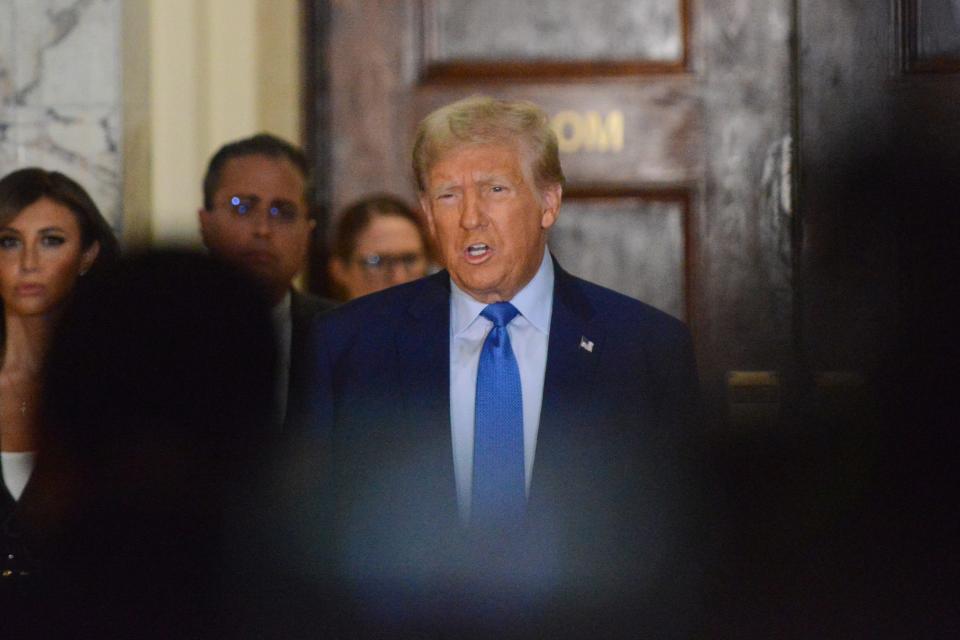Donald Trump is skipping another Republican debate. Is that a risky move in crucial primary states?
MIAMI ? There's little doubt Donald Trump has benefited from skipping the Republican presidential debates ? so far, at least.
The price for ignoring upcoming face-offs in Iowa and New Hampshire has yet to be calculated.
Though the former president plans to counterprogram Wednesday's third debate in Miami ? he has a campaign rally planned in nearby Hialeah, Fla. ? Trump also is calling on the Republican National Committee to cancel future debates, sparing him the decision of whether to attend those high-profile events.
“It is time for the Republican establishment to stop wasting time and money trying to push weak RINOs and Never Trumpers that nobody wants on the ballot," the GOP front-runner said, using an acronym for "Republicans in Name Only," at a gathering called the Florida Freedom Summit this past weekend.
Don't bet on that happening.

When are the next GOP debates?
The Republican National Committee has already scheduled the next debate for Dec. 6 in Tuscaloosa, home of the University of Alabama.
Republicans also plan to hold two debates in January before both the Iowa caucuses and the New Hampshire primary ? the first two delegate contests on the Republican calendar.
That means those debates will be harder to reject for Trump, who once paid a huge price for skipping an Iowa debate in 2016.
Trump skipping debates pays off
Right now, however, Trump and his allies say there's no reason for him to share a debate stage with a pool of struggling also-rans.
After all, his strategy is working.
The former president has a slightly bigger lead over the Republican field than he did when the first debate took place in Milwaukee on Aug. 23 ? and the lead is more than 40 percentage points in some cases.
"It certainly hasn't hurt him," said Alan Schroeder, author of "Presidential Debates: Fifty Years of High-Risk TV." "There's doesn't seem to be a dent in his ratings."
As a result, Schroeder said, "I don't think he's in a hurry to go up on that stage with those other rivals."
A recent Des Moines Register/NBC News/Mediacom poll showed that 57% of likely Iowa Republican caucusgoers say Trump's absence from the debates doesn't bother them.
The Iowa poll also said 42% of respondents said Trump should participate in at least one debate before the Iowa caucuses on Jan. 15.
Trump's polling lead grows
Trump and his aides said he is not inclined to debate other Republicans, especially if he has a big lead in the polls ? and he does.
On Aug, 23, the day of the first Republican debate in Milwaukee, Trump led the pack with 55.4%, according to the averages of national polls compiled by the Real Clear Politics website.
Trump's averages have also risen since the second Republican debate Sept. 27 at the Ronald Reagan library in Simi Valley, Calif.
On the eve of the third debate, Trump is averaging 57.9% in national polls, according to Real Clear Politics, followed by Florida Gov. Ron DeSantis (13.4%) and former South Carolina Gov. Nikki Haley (8.9%).
Haley does better in individual state polls and has passed DeSantis for second place in some of them.
In Iowa and elsewhere, DeSantis, Haley and other opponents have accused Trump of taking the nomination for granted. They have long tried to make an issue out of his debate snubs, to little avail.
DeSantis, who has been mocked by Trump and others for supposedly wearing boot lifts, made an intriguing dare for the Miami event: "If Donald Trump can summon the (guts) to show up to the debate, I'll wear a boot on my head."
Haley, who moved up in the polls after the first two debates, has said Trump has a responsibility to the voters to debate.
Trump paid a price in this state for snubbing a debate in of 2016
Trump does have some debate history in Iowa.
Eight years ago, Trump's decision to skip a pre-caucus debate in Iowa contributed to his loss of the state to Texas Sen. Ted Cruz.
“Ted Cruz didn’t win Iowa, he stole it,” Trump falsely claimed after Cruz' 2016 Iowa caucuses victory.
The front-runner plays defense
Trump's position is understandable, some analysts said: Front-runners often face the biggest risks in debates.
Trump's decision to avoid the prospect of a big mistake in jousting with lower-polling candidates has paid off, said Aaron Kall, debate coach at the University of Michigan. "He seems to have paid no penalty."
Kall, who attended the debates in Milwaukee and Simi Valley and will be part of the audience in Miami, said Trump has also been effective at holding competing events. A taped interview with Tucker Carlson during the first GOP debate and a speech in Michigan during the second stole some attention from his rivals.
Still, it may be tougher for Trump to refuse debates in Iowa and New Hampshire, Kall told USA TODAY, especially if a smaller number of candidates qualify for those debates and the polls have tightened.
"The pressure would increase for him to join," Kall said.
Acting like the nominee
Trump's refusal to debate is part of an overall strategy to cast himself as the inevitable nominee.
He has repeatedly called on other candidates to drop out and asked donors to stop giving his challengers money, saying it should be used in the campaign against President Joe Biden and the Democrats.
In his weekend speech in Florida, Trump said at one point that "people don't want debates."
At another point: "Why would I do a debate?"
This article originally appeared on USA TODAY: Donald Trump is skipping another Republican debate. Is that risky?
